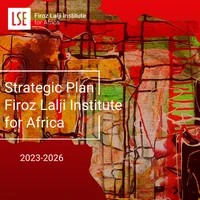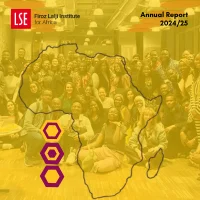About the Firoz Lalji Institute for Africa

The Firoz Lalji Institute for Africa pursues LSE’s long-term commitment to place Africa at the heart of debates on global issues by engaging with the continent through innovative research, teaching, and public events.
Mission
The Firoz Lalji Institute for Africa (FLIA) focuses on the study of, and engagement with, Africa. FLIA promotes the visibility of Africa in teaching, research, and policy engagement across LSE. It supports independent multi-disciplinary scholarship; open and issue-oriented debate; and evidence-based policymaking.
I cannot think of any comparable centre for the study of Africa outside of the continent that has made such a huge impact within such a limited time
Originally established as a centre, it became the Firoz Lalji Institute for Africa in 2021 after a generous gift from Firoz Lalji. As an Institute, FLIA sets its own research agenda and can plan for the future with secure funding.

FLIA has a three-year strategic plan charting how it will put Africa at the heart of LSE. For more information you can read the document here.
FLIA works across the social science disciplines on five main research themes: justice, governance, environment, humanitarianism, and health.
Through its academic, research, and outreach programmes, FLIA promotes collaborative partnerships and knowledge sharing between UK scholars and institutions, and their counterparts in Africa. FLIA strives to produce robust independent scholarship that raises the profile of African issues and perspectives in global debates.
The Institute hosts the Programme for African Leadership to empower a new generation of African leaders who will promote best practices of economic and social development in their organisations and countries.
Committed to public outreach, FLIA runs a wide range of activities such as the LSE Africa Summit, our public events series, the Africa Engagement Programme, the Africa@LSE blog, and the Hub for African Thought.
FLIA Annual Reports
Each year FLIA produces an annual report highlighting its research, events, engagement programmes, and student initiatives. Click below to read the latest issue.

FLIA Annual Report 2024-2025